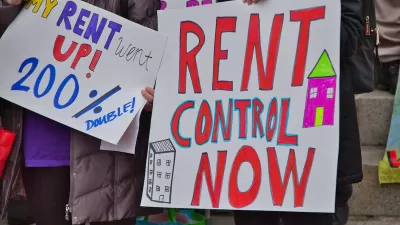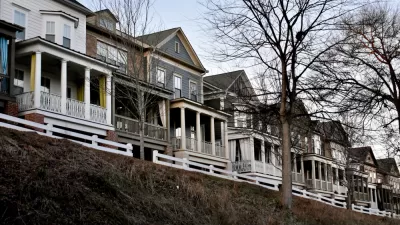Atlanta's inclusionary housing program, which closely reflects the proposed Denver plan, could serve as a bellwether for Denver's own future.

According to an article by Joe Rubino in The Denver Post, "As Denver’s version of inclusionary zoning inches forward (and some development industry groups cringe) the city of Atlanta and its program stand out as a comparable example of the concept in action."
Rubino points out that Georgia, like Colorado, prohibits rent control at the state level. This leaves cities like Atlanta and Denver with limited options for increasing affordable housing, which primarily include incentives for developers. "Unlike Denver, Atlanta’s program is focused largely on new apartment projects of 10 or more units in targeted parts of the city. It was recently expanded to cover for-sale housing in one neighborhood. In Denver, the policy would apply to any new development of 10 or more rental or for-sale units anywhere within city borders."
As Rubino writes, Atlanta's program created hundreds of affordable units in its three years of operation, and was not shown to decrease the rate of construction, a common fear. Rubino quotes Joshua Humphries, Atlanta’s director of housing and community development: "Multi-family (development) has continued at a comparable pace to the three years before inclusionary zoning and comparable to the rest of the city."
The article describes Atlanta's program in more detail and the response from the Atlanta Apartment Association, which disputed the city's claim that development wasn't slowed by the policy and added that many projects moved forward thanks to additional subsidies or funding sources.
Denver could finalize its inclusionary housing policy by late June.
FULL STORY: Denver’s controversial affordable housing plan mirrors Atlanta’s. Here’s what we can learn.

Planetizen Federal Action Tracker
A weekly monitor of how Trump’s orders and actions are impacting planners and planning in America.

Maui's Vacation Rental Debate Turns Ugly
Verbal attacks, misinformation campaigns and fistfights plague a high-stakes debate to convert thousands of vacation rentals into long-term housing.

Cuomo Is the Candidate of Both NIMBYs and Developers. What Gives?
In the New York City mayoral race, odd bedfellows align to preserve the housing status quo.

The Subversive Car-Free Guide to Trump's Great American Road Trip
Car-free ways to access Chicagoland’s best tourist attractions.

San Antonio and Austin are Fusing Into one Massive Megaregion
The region spanning the two central Texas cities is growing fast, posing challenges for local infrastructure and water supplies.

Charlottesville Temporarily Has No Zoning Code
A judge ordered the Virginia city to throw out its newly revised zoning code, leaving permitting for new development in legal limbo.
Urban Design for Planners 1: Software Tools
This six-course series explores essential urban design concepts using open source software and equips planners with the tools they need to participate fully in the urban design process.
Planning for Universal Design
Learn the tools for implementing Universal Design in planning regulations.
Heyer Gruel & Associates PA
JM Goldson LLC
Custer County Colorado
City of Camden Redevelopment Agency
City of Astoria
Transportation Research & Education Center (TREC) at Portland State University
Jefferson Parish Government
Camden Redevelopment Agency
City of Claremont





























